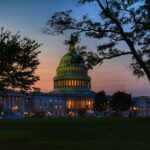Here’s a Compromise on Unemployment Benefits to Help America Get Back to Work
With at least 33 million Americans now unemployed due to the coronavirus shutdown, many are asking when and how to get the US economy going again. The cost of losing a job when there is rent to pay and children to feed is often devastating for many families. Sooner or later out of sheer human necessity, all 50 states will have to open up again even as they rightly still try to maintain social distancing to avoid a second COVID-19 wave. In fact, even now California and 40 other states are loosening their restrictions. The federal and state governments need to allow Americans to get back to work so they can provide for their families and regain some sense of dignity and purpose in their lives. Finding a compromise on unemployment benefits is one means to do that. Incentives matter, and both parties need to tailor policies in a way that helps restart the economy while also recognizing that people need assistance.
It is right to consider the tradeoffs of any policy. Social distancing may have been the right call. However, in April, 31 percent did not pay their rent and 7 percent of homeowners did not pay their mortgages. Moreover, an Axios-Ipsos poll found that 63% of Americans are “concerned about food shortages in the next month.” As if that weren’t bad enough, researchers from the American Academy of Family Physicians and the Well Being Trust estimate that up to 75,000 could die deaths of despair over the next ten years from social distancing and job-loss related suicide or substance abuse.
Current federal unemployment benefits are set by the $2 trillion Coronavirus Aid, Relief, and Economic Security (CARES) Act. The CARES Act provides an unprecedented $600 a week in Federal Pandemic Unemployment Compensation (FPUC) in addition to whatever benefits a person may receive from their state government. That means the average person receiving such aid now gets about $978 a week—an incredibly high amount.
That was, of course, the point. By providing higher benefits, folks could stay home and still make ends meet, thereby helping cushion individual economic fallout and flatten the curve. But that also obviously means fewer Americans will want to find work once businesses are allowed to reopen.
These generous federal unemployment benefits end on July 31 and already Congress is arguing over what—if anything—they should do next. Many Democrats want to extend these benefits until at least 30 days after the president lifts the current declaration of emergency. In fact, one Democratic bill would specifically maintain those benefits for six months after the declaration ends for anyone already on FPUC. However, most Republicans would like to reduce or end unemployment payments to nudge people back into the labor market and stop this downward spiral.
A compromise solution could instead reduce federal unemployment benefits, but still extend them beyond July 31. The catch is that only those who return to work would receive those reduced benefits—those who do not find a job will not keep any benefits. This idea was suggested by Michael Farren, a research fellow with the Mercatus Center at George Mason University.
Such a policy is flexible enough to help Americans regardless of their local community’s status. If their home area is still shut down, full FPUC will help them pay their bills. If their locality is opening up, receiving reduced FPUC for a limited duration while also working will encourage employment and help folks recover financially. Indeed, if future localized lockdowns become necessary, any additional money provided now will help them later.
Furthermore, turning the unemployment benefits provided by the CARES Act into a stimulus package is a good idea since it takes a long time to recover from recessions. For instance, an estimate by the nonpartisan Congressional Budget Office warns that unemployment will remain in the double-digits until it slowly drops to 9.5% “by the end of 2021.” In other words, America may still be in bad shape even a year and a half from now. With this in mind, I would add a caveat to this proposed compromise. This solution assumes that most states will reopen by July 31. If they do not, because of a second wave or because local PPE and contact tracing are inadequate, then the question of extending FPUC should be revised. To be clear, if governments will not let people work, then they need to compensate them for their loss of income. But if they are getting out of everyone’s way, then FPUC policy should encourage a return to employment.
Americans want to earn their living and are getting increasingly antsy. Congress would be wise to find a flexible solution to the CARES Act’s expiring unemployment benefits that will help American workers and not harm them.




